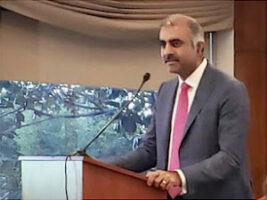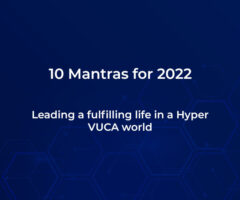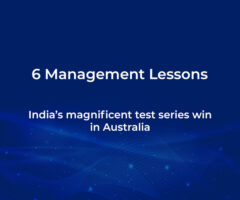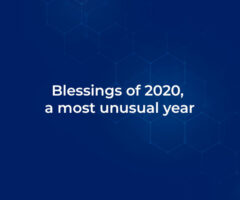Speech at McKC Values Day, July 26, 2013
I am so happy to be here with you today. The 8 wonderful years I spent at McKC has been one of the greatest blessings of my life. Sometimes in life you are at the right place at the right time, and you find a perfect alignment between the task at hand and your intellect, heart and soul. When this alignment happens, you can create magic!! McKC was such a magical period of life for me. I was able to help create what is not just an invaluable asset for McKinsey, but a great example of intellectual horsepower and innovation that can be delivered from India. At a personal level, the McKC journey has been equally profound for me. It helped me discover myself and the leader within me. Large part of what I know about management, entrepreneurship, innovation, team building and leadership is because of McKC. So before I share any insights with you, I just want to say McKC Thank You for everything!! You will always have a very special place in my heart.
Now, let’s come to the topic for the day – moments of truth. When I was asked to speak on this topic, I immediately felt that there could be no better story to tell than the incredible McKC journey itself. Moments of truth are crucial moments where you have to make choices on which much depends. Often the choice is between an easy but somewhat sub-optimal path, and the difficult but right path. Making these choices is not easy. We are often drawn towards the path of least resistance. We are creatures of habit. It is for good reason that Newton’s first law of motion is about inertia! It is not easy to rouse ourselves and choose a difficult path. However, truly successful organizations and individuals are those who are able to face their moments of truth with courage and take the right path. When you do so, you often have to face conflict and personal hardship. However, the pay-off is huge. Making the right choices consistently takes an organization beyond the average to spectacular success and the path of greatness. Moreover, for the individual, it helps them find purpose in life, realize their full potential, make a positive contribution and leave a legacy.
Clearly facing your moments of truth and making the right choices is very important. Now, how do you make the right choices consistently? I believe there are two important ingredients for doing so: 1) Clarity of your values, and 2) Courage to make the difficult choices and live with the consequences. McKC journey offers many fantastic examples of how so many people faced moments of truth and made the right but difficult choices. There can be no better inspiration for the current generation of McKC to learn from the incredible journey that McKC has gone through. So today I will share with you 5 moments of truth from the McKC journey – the decisions we had to make, the consequences of our decisions, and what we can learn from them:
1. Birth of Analytics
Analytics is one of the crown jewels in the McKC crown. I understand Advanced Analytics has now become a major theme in the Firm. McKC can justifiably take credit for sparking the Analytics revolution within McKinsey. However, the origins of Analytics were rather humble and even covert. When I rejoined McKinsey in 2002 and came to McKC, I realized that our analysts had better Excel skills than what I ever had as a consultant and were doing a lot of the analysis that consulting teams used to do. That gave birth to the idea of Analytics. At that time McKC was two departments, KoC (Knowledge-on-Call) and Practice Research, and off course Firm IT. We presented the idea of a new Analytics service line to the McKC Board. The response was not just dampening, it was dismissive. There were many objections. 1) We used to have a similar specialized group within Firm IT in Dusseldorf and London but that was shut down because we could not provide them career paths; 2) Do you think our consultants really need Analytics support from McKC. They are smart enough to do everything on their own; and 3) There is already an Analytic Services team in New York. It has never grown beyond 4-5 people despite being there for many years. That seems to be the limit of the demand for Analytics in McKinsey!!
Now, this was a moment of truth for us. It would have been very natural for us to just drop the idea after such strong negative feedback and get back to managing KoC and Practice Research. But, we did not give up. We believed in the idea and its potential for client impact, so we decided to persist. And, where there is a will, there is a way!! We had a slice of fortune. I was having a chat with a friend, who was a Senior Consultant in the Chicago office, about this idea. He mentioned he could use some help on analysis of a survey he was doing for a client. I jumped on that opportunity. We got two of our best analysts from KoC to do this analysis, which went well. We then realized that Firm IT at McKC had set up a Survey Design Centre, to develop web surveys. So we tied up with them where they would recommend us to consulting teams coming to them for survey development. So this is how Analytics started. It was a very humble and difficult start. But we persisted. We were entrepreneurial, we formed many alliances, and we leveraged the existing people and infrastructure in KoC to develop a new capability with almost no incremental investment. We soon started seeing success and kept building on them. Rest as they say is history!!
What do we learn from this – Back your instincts and persist in your journey despite criticisms and difficulties. If you persevere, what might seem like a hopeless situation can turn into a wonderful success!!
2. Scope of KoC
I had joined McKC as the first manager of KoC, and it has a very special place in my heart. More importantly, in many ways the story of McKC’s growth is tied to the growth of KoC. So, I was very sad to learn that KoC service has been disbanded and team restructured. Perhaps, every idea however great has a certain half life!!
KoC service line was set up as a new, global service in 2002. It was to be delivered across McKC and the then new knowledge centers in Waltham (near Boston) and Brussels. Our moment of truth was the debate on the scope of KoC. The initial idea for KoC was to be a Quick Desk – to support transactional requests that needed to be turned around in a couple of hours. However, we knew there was a vast universe of generalist research requests that went beyond quick turnaround. We were already getting huge demand at McKC for requests that fell in a “grey zone”, that were neither Practice nor Local R&I. Consultants were very keen for us to support those generalist requests as they got great quality from us. However, many units in the Knowledge Network were apprehensive that KoC getting a broad mandate would cannibalize their demand. We persisted in a difficult debate that did not win us friends but one we knew was in the best interests of the Firm. We were eventually able to get the outcome we wanted – agreement on the scope of KoC to be not just a Quick Desk but to be the Generalist Research Shared Services for the Firm.
This decision had far reaching consequences for McKC. KoC became the single largest driver of the growth of McKC. Defining the scope of KoC broadly instead of narrowly gave us the opportunity to bring in great talent and build strong relationships with CSTs (Client Service teams) by serving them on a broad set of needs. KoC grew to over 170 analysts, by far the largest unit in the Knowledge Network. What was even more remarkable was that this service line, which was supposed to be the bottom of the pyramid, ended up being the biggest driver of innovation not just for McKC but for the entire global Knowledge Network.
The secret behind this incredible success of KoC was allowing talent to flower to their full potential. We had been fortunate to hire some excellent talent in the initial years of KoC. As this talent matured in a few years time, they provided tremendous energy and capacity for experimentation and incubation of new ideas, and that too at almost zero cost. Almost every major innovation we did at McKC from 2002-08 had roots in KoC. KoC pioneered the concept of staffing of McKC analysts onto CSTs way back in 2003. We have already talked about KoC’s role in the birth of Analytics. In addition, Direct-to-Client and the Knowledge Analysts (“remote consultant”) initiatives originated from KoC. KoC also gave birth to many specialized capabilities like Economics, Growth Decomposition team (that became the Strategy team) and Corporate Finance R&I. Many of these capabilities were initiated as “interest groups” but eventually reached a scale and depth where they metamorphosed into full-fledged Practice teams.
What do we learn from this – Have the courage to stand up for your beliefs and put client impact above internal politics. Focusing on what’s right for clients is the best approach to overcoming self-serving internal politics. Moreover, invest in talent and allow it to flower. This is the best investment you can make as a leader and over time it will repay you manifold!!
3. Transition of research teams to Practices
The next big moment of truth was the question of ownership of our Practice Research teams in 2004-05. Over years we had developed a host of sector and function specialized research teams. These teams were aligned with the Practices but the eventual ownership i.e., evaluation, payroll, P&L, was with McKC. We had built deep capabilities, but our people were beginning to hit a career ceiling. People had grown to SRA (Senior Research Analyst) level and in a few cases Specialists. To go beyond those levels required two key enablers – ownership of proprietary knowledge assets which were controlled tightly in the Practice hubs and mentorship by Practice Leaders. So, we came to a conclusion that for our research teams develop to their full potential, they had to be owned by the Practices. We then began a formal process of handing over ownership of the research team from being locally owned by McKC to the Practices. This was a very difficult decision and painful transition process for us in the McKC leadership. It felt like cutting out a part of one’s body. It was not about loss of control and of P&L, but letting go of capabilities and people that were such an integral part of McKC and we had nurtured with a lot of care and attention.
Practices taking ownership of the research teams was a game changer for the Practice group at McKC. The Practice group at McKC had been in a holding pattern for a while. As Practices took ownership and started feeling a full control over the resources and started enjoying the economic benefits of offshoring directly, their attitude towards the research teams at McKC changed significantly. They started transitioning more work including ownership of their prized knowledge assets, and investing more in people helping grow them to more senior roles. This change had far-reaching, positive consequences for McKC. This not only led to institutionalizing Practices at McKC but also laid the foundations for the development of the Centers of Competence (CoCs). So, what initially felt like a “sacrifice” from McKC ended up shaping the next stage of growth of McKC.
What do we learn from this – Put client and people interests above your own needs. Sometimes you have to let go of what you hold dear so it can flower to its full potential. So, be prepared to make what might feel like a hard decision in the short-term; it will likely payback handsomely in the long-term.
4. McKC vision and the birth of CoCs
By 2006 McKC had reached not just a nice stability but a very positive momentum. KoC was growing, Practice Research transition had happened, and Analytics was acknowledged as a new service line and developing nicely. We had far surpassed any expectations that Firm had of us and could have just coasted. However, we decided not to take the easy path. We believed McKC could contribute lot more. So, we launched a vision exercise in 2005-06. The purpose of this vision exercise was not how we could grow more research services, but how we could make a significant difference to McKinsey’s client proposition and help it gain competitive advantage in the marketplace. It was pretty ambitious for an offshore research center to ask itself how it could shape the strategy for one of the greatest professional services firms in the world!! This challenge generated tremendous energy at McKC. We put together a cross-functional team across the McKC groups and embarked on this ambitious exercise. After an intense 3-4 months project we came up with the concept of Centers of Competence (CoCs) – a new consulting model that would make significant improvement to Firm’s traditional client service model in a number of areas by bringing together subject matter experts, proprietary knowledge and offshore delivery.
We looked at two sets of areas for CoCs to make an impact – where McKinsey was losing to competitors and those that were likely to grow significantly in future. We finally identified three areas where we set up our first CoCs. These were PSM (Procurement & Supplier Management), O&O (Offshoring & Outsourcing) and Risk Analytics. We were thinking very big here, at the same time we also took a practical approach. We identified the initial CoCs not just based on market opportunity but where we had strong Partner relationships and knew we would get support for experimentation. We started the CoCs with existing hi-potential talent from McKC. As we got some traction, we brought in highly specialized talent who were acknowledged industry experts with over 15 years of experience. Many of them were brought onto the “Expert Consultant” track. It was a big risk as this was a dramatic departure from our existing people model at McKC. This people model experiment worked out well and proved to be a game changer for our CoCs.
CoCs have taken McKC into a totally different orbit. They have helped make Firm’s client service model Faster, Better, and Cheaper in a number of areas. As a result, Firm has won new clients (e.g., PSM and Manufacturing diagnostics), been able to serve existing ones in new ways that might not have been possible earlier (e.g., Risk Analytics), and has gained new sources of revenue (e.g., P360 service line). It would have been impossible to visualize McKC contributing in a central way to such breakthrough client impact just a few years back. It is great to see that Firm has embraced CoCs in such a major way. I am convinced that we have seen only the tip of the iceberg so far with the CoC. They are such a powerful client service and business model innovation for the Firm that lot more should happen in this space!!
What do we learn from this – Be Proactive and Think Big, VERY BIG!! At the same time, find a practical link to progress towards your dream. As you do that, seemingly impossible dreams can also come true!!
5. The mixed experiment with “Direct to client”
One of the recurring themes in the McKC journey has been the idea of providing research services directly to clients. We knew there was demand for it from clients as seen by the growth of the research providers, and we are always very confident that McKC and the global Knowledge Network could deliver a distinctive proposition. We had multiple initiatives on this during my tenure as a McKC leader. The first initiative happened in 2002 and we did some excellent client work with a hi-tech company. We then made a very big push on “Direct-to-Client” (D2C) in 2007-08 when Adil, the India Office Manager, got very interested. We together made a very ambitious plan and pitched to the Shareholders Council. We had some interesting client successes, especially a large Asian Conglomerate that I believe we are still supporting. However, it is fair to say that the D2C as a theme never gained the traction in the Firm that we had hoped for. We realized that CSTs were nervous about directly opening their client relationships and had concerns about cannibalization. We realized that the only way to provide this service was through CST intermediation. So, we modified our approach accordingly. That worked somewhat better but in most cases we were not able to make this opportunity a top priority for the CSTs and therefore not able to progress dialogue with clients.
So, “Direct to Client” was a mixed experiment. It did not achieve the significance that we had expected. However, it had many positive by-products. It helped us raise our quality and capabilities significantly. Lot of the templates and standardized end products (e.g., company profiles, standardized financial analyses) that have become essential to the way research now happens in McKinsey emerged from the first D2C pilot we did back in 2002. Even more importantly, D2C pilots that happened at McKC and elsewhere in the Knowledge Network, were an important early influencer for McKinsey Solutions (developing proprietary research into Knowledge Assets that can be offered to clients), which has now become a big priority for the Firm.
What do we learn from this – All experiments will not succeed. Failures are a necessary part of the journey. You should have the courage to accept failures and to adapt your approach. However, be conscious about “connecting the dots”. Your learnings from apparent failures could lead to unintended positive consequences that might go well beyond your initial ambitions!!
I hope these “moments of truth” from the McKC journey were a nice jog down the memory lane for my many fellow travelers who are still at McKC. In addition and very importantly, I hope these stories are a source for inspiration for the new generation at McKC. You are all inheritors of a great legacy. McKC is a very special place – the greatest knowledge centre in India, perhaps in the world. You all should feel very proud of this legacy and the organization you are a part of. And, I hope that motivates you to build and to take McKC to even greater heights.
In conclusion, I want to leave you with four messages from the incredible McKC journey:
- It is all about Clients and People. You should focus on what’s right for them, and the difficult choices become very simple
- The single most important quality you need as a leader is Courage. Build the courage to make the difficult decisions and you can take your organization and yourself to amazing heights
- All of you can do it. People who built McKC were ordinary people. They were just infused with the special McKC spirit that lifted them to extraordinary deeds. So, re-discover and strengthen the McKC spirit
- Living the values and making difficult decisions is a habit. The more you do it, the better you get at it. So start now!!
My best wishes to all of you for a wonderful journey ahead!!
God bless!!



